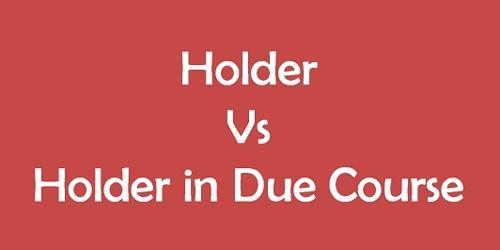Holder refers to a person; we mean the payee of the negotiable instrument, who is in possession of it. S/he is someone who is entitled to receive or recover the amount due on the instrument from the parties thereto. Holder in due course means a person who must have the possession of the instrument.
Holder
- Definition: Holder is the person who is entitled in his own name to the possession of a negotiable instrument.
- Nature: Normally a payee or endorsee is a holder. A holder may be or may not be with possession of the Instrument.
- Endorsement: If the payee or endorsee dies, then the legal heir is the holder. If there is a forged endorsement then, the last endorsee is the holder.
- Bearer: If it is a bearer cheque, the person in whose name it is made is a holder.
- Theft/Deceit: If it is damaged the payee or last endorsee is the holder. If it is stolen, then also payee or last endorsee is holder because a thief cannot become a holder. The holder has the right to obtain a duplicate of an instrument is lost. A holder can cross a cheque if it is not already crossed.
- Maturity: A person can become a holder, before or after the maturity of the negotiable instrument.
Holder in due course
- Definition: Holder in due course means a person who must have the possession of the instrument. This is the basic difference between the Holder and Holder in Due course.
- Nature: Holder in Due course must obtain the instrument in Good Faith.
- Endorsement: If the instrument bears not-negotiable crossing, then the NO person can be a holder in due course.
- Bearer: If the instrument bears A/C payee crossing and restricted endorsement then NO person can be a holder in due course.
- Theft/Deceit: Forgery/theft/deceit do not convey any title.
- Maturity: A person can become a holder in due course, only before the maturity of the negotiable instrument.














